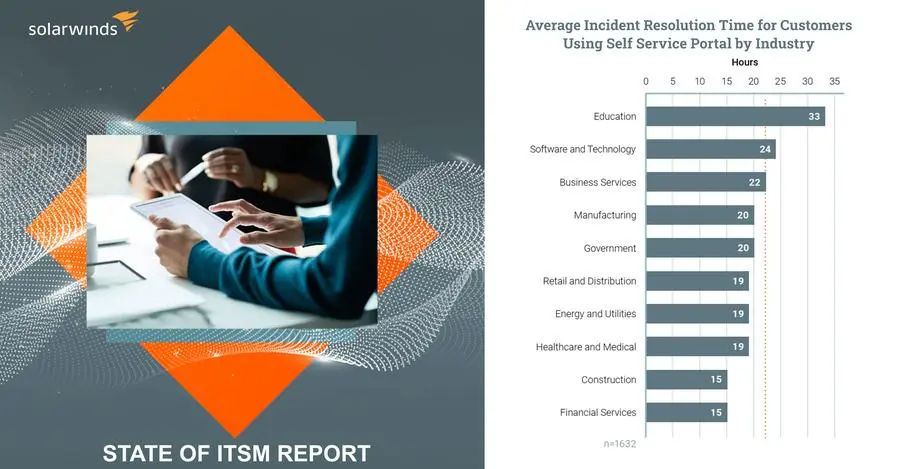PHOTO
Dubai, United Arab Emirates – SolarWinds (NYSE:SWI), a leading provider of simple, powerful, secure observability and IT management software, has released its 2024 State of ITSM Report, which provides practical, actionable guidance rooted in real-world Information Technology Service Management (ITSM) strategies. This report analyzed over 2,000 ITSM data systems and 60,000 points of anonymized and aggregated SolarWinds customer data.
Overall, the data asserts that organizations cannot streamline their ITSM operations by simply adding more staff members. Instead, based on SolarWinds’ findings, improving operations requires a multi-faceted strategy of deploying additional effective methods, including:
- Employ Automation Rules: Automation rules save 3 hours per ticket.
- Use Self-Service Portals: Leveraging a self-service portal can reduce resolution times by as many as two hours per ticket.
- Implement Knowledge Base Articles: Organizations that implement knowledge base (KB) articles resolve incidents an average of six hours faster than those that do not.
- Utilize Service-Level Agreements: Utilization of service-level agreements (SLAs) resolves tickets an average of two hours faster.
When ITSM teams combine each of these methods, the result is a mature service desk prepared for various types of requests. The ITSM Report provides a more in-depth look at each method and its specific benefits.


Automation Rules
According to the data, implementing automation throughout the ITSM workflows improves an organization's ability to meet its SLAs. The report shows that increased levels of automation correlate with a lower percentage of SLA misses (or the ratio of SLA misses to total tickets submitted.) Automation also helps organizations reduce the manual workload on service desk agents, scale their ITSM operations, and free up team members to focus on more strategic initiatives that drive long-term business success.
Self-Service Portals and KB Articles
The study indicates that the effects of self-service portals are two-fold. First, they allow the user to take charge of their ticket resolution, facilitating an immediate response to the problem. Second, it reduces the overall resolution time, which results in a more efficient service desk.
According to the study, KB articles are often the lifeblood of efficient self-service operations, as they allow users to find solutions to their issues, sometimes without even needing to submit an IT ticket. KB articles are most effective when they include information that is easy to understand, easy to access, and most relevant to a customer's problem. Ideally, the result is a reduction in the number of tickets and more time — for both customer and agent — to focus on more pressing issues.
Service Level Agreements
Automation, self-service portals, and KB articles are each important in helping the service desk maintain its SLAs with its customers. SLAs help set critical benchmarks for customers to judge the level of service. According to the report, maintained SLAs help improve customer trust and enhance resource optimization. They also create avenues for continuous improvement. As a service desk continually meets its SLAs, it can look for opportunities to develop new benchmarks and enhance response times and operational efficiencies.
Changing Conventional Thinking
Conventional thinking suggests that more ITSM staff translates to better ITSM services. However, the report shows no definitive correlation between the number of service desk agents and the time necessary to resolve tickets. Instead, ITSM teams should ensure they have a comprehensive plan in place, focusing less on large-scale hiring efforts and more on sound SLAs, intuitive automation, refined self-service portals, and easily accessible knowledge-based articles.
ITSM teams can learn more about how SolarWinds supports each of these efforts at https://www.solarwinds.com/itsm. For the full 2024 State of ITSM Report, including breakdowns by industry, click here.
About SolarWinds
SolarWinds (NYSE:SWI) is a leading provider of simple, powerful, secure observability and IT management software built to enable customers to accelerate their digital transformation. Our solutions provide organizations worldwide—regardless of type, size, or complexity—with a comprehensive and unified view of today’s modern, distributed, and hybrid network environments. We continuously engage with IT service and operations professionals, DevOps and SecOps professionals, and database administrators (DBAs) to understand the challenges they face in maintaining high-performing and highly available hybrid IT infrastructures, applications, and environments. The insights we gain from them, in places like our THWACK community, allow us to address customers’ needs now and in the future. Our focus on the user and our commitment to excellence in end-to-end hybrid IT management have established SolarWinds as a worldwide leader in solutions for observability, IT service management, application performance, and database management. Learn more today at www.solarwinds.com.
The SolarWinds, SolarWinds & Design, Orion, and THWACK trademarks are the exclusive property of SolarWinds Worldwide, LLC or its affiliates, are registered with the U.S. Patent and Trademark Office, and may be registered or pending registration in other countries. All other SolarWinds trademarks, service marks, and logos may be common law marks or are registered or pending registration. All other trademarks mentioned herein are used for identification purposes only and are trademarks of (and may be registered trademarks of) their respective companies.
© 2024 SolarWinds Worldwide, LLC. All rights reserved.




















